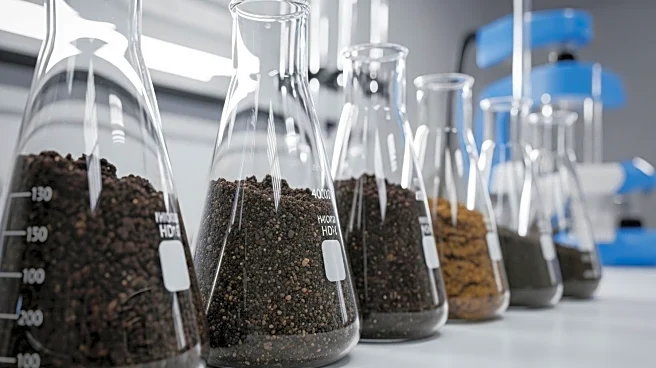What is the story about?
What's Happening?
Researchers have adapted the Bergius process, originally developed for synthetic oil production, to create humus, an organic soil component. This process involves applying water, heat, and pressure to biomass, converting it into hydrocarbons more rapidly than natural methods. Humus, rich in polymers, supports bacterial growth and improves soil quality, making it valuable for agriculture. It also acts as a carbon sequestration agent, with one tonne capable of binding up to 50 tonnes of carbon in soil. The adaptation of this process aims to address the growing need for sustainable soil improvement as global agriculture faces the challenge of feeding an increasing population with deteriorating soil quality.
Why It's Important?
The development of this humus production technology is significant as it offers a sustainable solution to enhance soil quality and agricultural yields. With the global population expected to reach 10 billion, improving soil health is crucial for food security. The ability to sequester carbon also contributes to climate change mitigation efforts. Humify, the company founded to commercialize this technology, has demonstrated up to 20% yield increases in Chinese field trials, highlighting its potential impact on global agriculture. This innovation not only addresses soil degradation but also reduces methane emissions by utilizing waste organic matter.
What's Next?
Humify plans to scale up its operations by establishing a pilot plant capable of producing 3,000 tonnes of humus annually. The company is focused on optimizing energy consumption during the biomass heating and cooling process to enhance competitiveness. As the technology advances, it may attract interest from agricultural stakeholders and policymakers seeking sustainable solutions to improve soil health and increase crop yields. The success of this initiative could lead to broader adoption and further innovations in soil management practices.
Beyond the Headlines
The adaptation of the Bergius process for humus production highlights the potential for repurposing existing technologies to address modern challenges. This approach not only contributes to agricultural sustainability but also offers a model for integrating waste management and climate mitigation strategies. The ethical implications of improving food security and environmental health through technological innovation may influence future research and development priorities in the agricultural sector.















